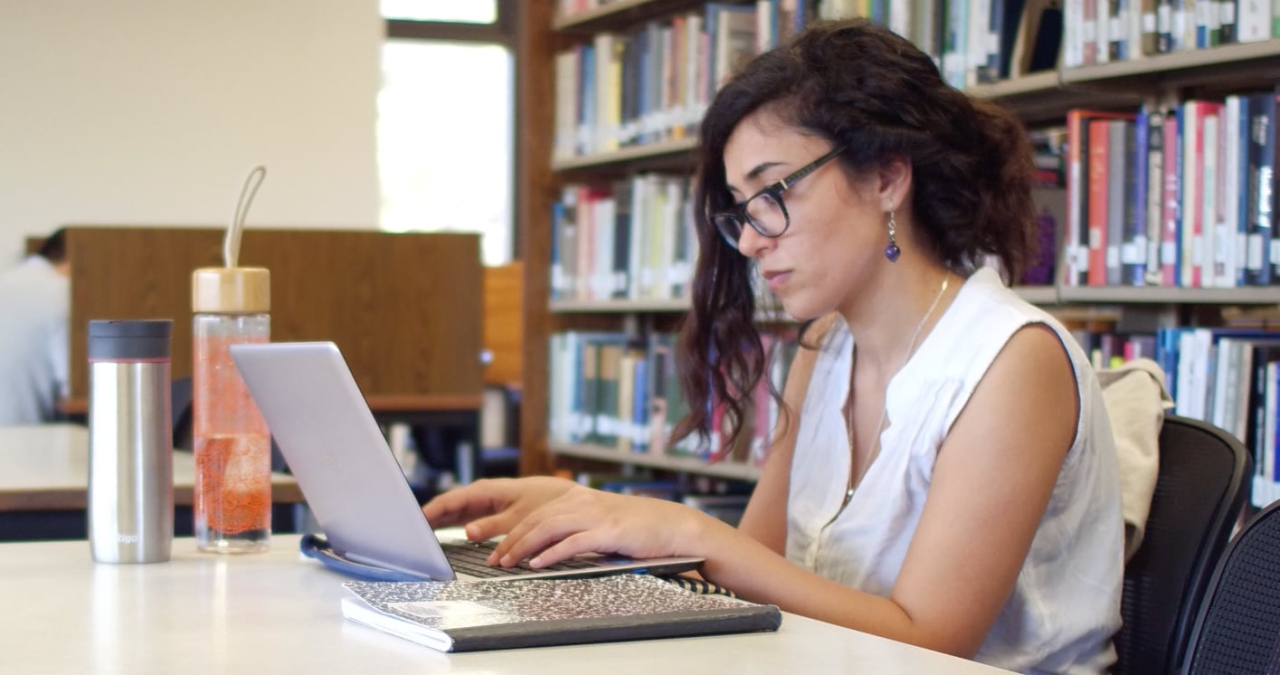Program Details: International Policy and Development
Customize your master’s degree based on your interests and career goals.
Why the Institute: Learning to make a difference
My name is Lama Ranjous and I’m from Syria. I’m studying international policy and development. I started my master’s degree in Damascus. I finished the first year, and I couldn’t continue because of the conflict. I knew about a program called 100 Syrian Women. They give scholarships basically in Canada and United States.
I applied, I got the scholarship, and they advised me to apply for MIIS. I searched for the courses, and international policy and development. I came directly from Syria to Monterey and it was huge change in general. There is certain environment at MIIS. There is international community. A lot of students from all around the world and each one of them holds a different experience.
Different story. Different conflict sometimes. And you relate to this story, you feel this connection. My support system are my friends are here. They understand a lot, they are really kind. We eat together, we cook together, and we are creating memories here. Inside Syria, there you’re just overwhelmed with everything, and I was working in the humanitarian organization so I was dealing with the situation every day.
But I couldn’t stop and look so what’s really happening. Here, I am taking Introduction to Policy, Women and Human Rights, and Conflict Resolution. I just can sit right now and try to analyze it very far away from my emotion. Now I can understand. I can be very objective about this.
I came here with a dream and I think it’s now clear for me. I want this education to empower the youth inside Syria in a way that they will be able to build the country again. Or to feel that they can go there and start rebuilding again.
Connect with Your Advisor
Your personal enrollment advisor is ready to help you navigate the application process, understand admission requirements, customize your program (see options below) to meet your career goals, explore options for financing your education, and connect with current students, alumni, career advisors, and faculty.
Connect with your enrollment advisor.
Program Duration
You can earn your degree in 12 consecutive months, 16 months (three semesters with a summer break), or over four semesters:
- If you are starting the program in the spring, the shortest option available to you is 16 months.
- If you are starting the program in the fall and want to accelerate your return to the workforce and you have professional experience (relevant to your field of interest), consider the 12-month option, which includes a January term and summer semester.
- If you need to gain work experience while you earn your degree, consider the 16-month option, which takes longer but leaves the January term and/or summer open for internships or other experiential learning opportunities.
- If you want to craft a niche career, you can add a specialization or a second master’s degree in our carefully designed joint master’s degrees. This will take up to four semesters for you to complete.
- If you would prefer or need to spend more time in your program for any reason, we encourage you to add a specialization or pursue a joint master’s degree program for a four-semester program.
You only need to finalize a decision on which path to pursue after you have enrolled—your career and academic advisor will help you make this choice.
Practicum Options
Your final semester practicum can be completed remotely allowing you to transition to your preferred location before you graduate and gain professional experience in a context that closely aligns with your career goals.
Language Study and Intercultural Competence
Bridging cultural and linguistic barriers is key to a successful career in policy and development, so you will take several content-based courses in a second language and/or courses in intercultural competence (ICC).
In language classes, you will have the opportunity to develop specialized vocabulary and content knowledge for your field of interest, give presentations, and improve your professional writing skills. ICC courses give you the opportunity to learn about managing global and cross-cultural teams, addressing issues of power and identity, and improving communications.
We will work with you to align your courses with your evolving career goals.
Career-Related Modules
Your core coursework is made up of “baskets” of courses from which you can pick the course that best fits your interests while satisfying the core requirement. You will also have electives to deepen your expertise in particular areas where our faculty have unique strengths. This flexibility allows us to offer modules of courses grouped around specific, high-demand, and transferable career competencies in areas like conflict studies, social change, evaluation and analytics, migration, program management, data analytics, and organizational management and leadership.
Specializations
You may pursue an optional career-oriented specialization, which you can start using electives during your degree program and complete before or after your master’s degree program. Your options include:
- Financial Crime Management
- Intercultural Competence
- Language Studies for Professional Purposes
- See the full list of specializations and certificates for other options
Joint Master’s Degree
You can earn two master’s degrees in just four semesters and 60 credits, setting yourself up for a unique career trajectory.
- The Joint MPA/International Policy and Development prepares you to lead in the creation and implementation of policies that advance local and global development.
- The Joint MA in International Policy and Development/MA in International Trade offers a multidisciplinary approach to international development and practical global trade.
Peace Corps Connections
-
Returned Peace Corps Volunteers (RPCVs) are encouraged to apply for the Paul D. Coverdell Fellows Program, earning yourself a guaranteed scholarship.
-
You can integrate Peace Corps service into your degree through our Options for Peace Corps Service, earning yourself a 50 percent tuition scholarship for your final semester.

